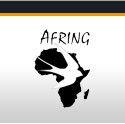AFRING Fact Sheet
- What is Afring?
- What does AFRING do?
- Who is behind AFRING?
- Why do we ring birds?
- What do we learn from ringing?
- What can I do?
- How do I report a ring?
What is AFRING?
AFRING (the African Bird Ringing Scheme) is an initiative
to develop bird ringing programmes within Africa.
What does AFRING do?
AFRING trains people to become bird ringers and organises meetings
for all people that have an interest in bird ringing. Another
focus of AFRING is to standardise African ringing data and to
create a central platform for all African bird ringing data.
Who is behind AFRING?
AFRING is supported by a number of organisations: The Animal
Demography Unit, the South African Bird Ringing Unit (SAFRING),
the African-Eurasian Migratory Waterbird Agreement (UNEP/AEWA)
and the European Commission.
Why do we ring birds?
We know that many birds migrate from one part of the world to
another during the year, but often we do not know exactly where
they go to or come from. At the same time, many species are
threatened with extinction and need our conservation efforts.
To be able to protect them and the sites they depend on, we
need to know more about their biology and migration routes.
This is where ringing plays a valuable role.
What do we learn from ringing?
Professional bird ringers clip metal rings around the bird’s
leg displaying the ringing scheme’s name and an unique
number. With this number, the bird can be identified when re-captured
or found dead. When someone recovers a ring and reports its
number to the ringing scheme, the scheme can track the history
of the bird’s movement. This enables us to learn more
about migration routes and wintering areas as well as population
sizes.
What can I do?
If you have found a bird that has a ring, please report to the
relevant ringing scheme. If you are interested in becoming a
bird ringer, have a look at the Ringing
Courses section on this website.
How do I report a ring?
When reporting a ring to us, there are several details you should
include:
- The ring itself or, if you don’t have it, the number of the ring and its colour
- The date when you found the ring and the locality where you found it (coordinates if possible, but also include the name of the nearest town)
- Species name (if you can identify it) or a detailed description of the bird
- The circumstances under which you found the ring (e.g. was the bird alive or dead, and if dead, how and when it died (i.e. was it already decomposed))
- Your personal details & contact information
If you have access to the internet you can report the ring via the South African Bird Ringing Unit's on-line ring recovery page.



